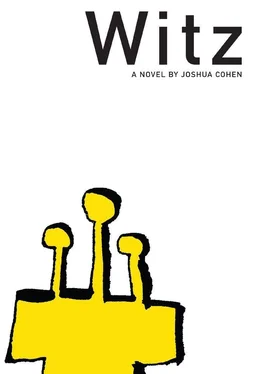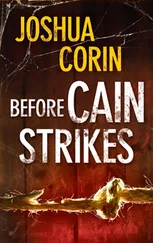Above the sill of the world, a pair of diamonds suspended. The moon and its stars, and the diamonds, too, are the impurities in the night, of the night, impurifying as those diamonds they’re only poetry, art; casements flecked with white paint, rubbled with plaster chips, remains of parget…these lights — no candles or candlesticks, which have been sacrificed to the rubble, melted down with their wicks wicked away, wisped into smoke with the upward ambition of flame — hover; what’s left is only their purpose: a question…does the light float in darkness? or the darkness around light?
No weather and the roof is maybe, hymn, missing, skullcaps blow off, blown around; there’s no refuge. Whether the roof was bombed through or, perhaps, has been landed on one too many times by messenger storks resting on which season’s way out…or, in another interpretation: there is, indeed, a roof, and from there’s where it’s raining, then snow.
Skypages blow from books that have pages, loose pages blown, wet paper mushed, pulped, wildly flung about and grasped at, stolen and promise to tell no one, they’re killed for; rain to snow, clumps of snow as if stillborn moons, this sleet and hail, this fiery hail, retributive fallings, a weather testamentary, Creation first testing its power: what can my sky do? is what God should be asking…though ignoring that voice, they jump out of their own voices and stoop to grab at skin now, piecing through the pages, this vellum taken in vain, binding themselves back together without a sense for order, with spit dripped from the seams of a beast remade, with weather into the shape of a cloud dispelled: to stoop and shirk from any mumble, that would avail a response to the mumbling of the rabbi who’d begun his own not in prayer but dismay — at their willingness to follow fate, but not his called command. From what illiterate womb is such disorder born? This reading of prayers they’ve read or should’ve read or had read to them lifetimes before, and yet prayers they’ve never, not even once, understood; the ignorance of a tongue redeemed…as they’ve never listened, heard, attended with still and silence. If reading for us is only memory — daily repetition as a guide to the pilpul perplexing, undertaken with any acronym’s help, enlisting all manner of mnemonic wonder and signs — then the following mysticism might preempt, be permitted: In the beginning was the Word, that word was all words, the book, any book, in which each letter falling into the arms of its mother is in itself the word whole — the Shibboleth, the Passwoyd, the Name of God, no one knows. The recitation of a spare set of teeth. While praying, no one knows what they’re saying not because no one knows the language of prayer, but because no one knows themselves, and so they pray: they dress themselves and shave and stoop and bow only in order to hope anew — only to ask for a tomorrow for which they might be dressed, be shorn, stooped and bowed, in which to pray again.
For an end to all this, to all time.
Tonight, though, they’ll be gone, with only their refuse, their lost and never to be found again articles to acknowledge existence, forgetting’s relics already enshrined, cataloged as just so much charity within a book glassed on display, not for use (a ledger, the list) — only to be replaced next week, same moon’s time, by a new shipment, a congregation bound in a box. The shul’s an enormous phylactery; the shul’s swollen like a stomach full and starved. No oneg shall follow, no Kiddush luncheon will save with its sponsor.
Slowly, with the pressures of privation, the weather, they remember, a response or else the responded to, same difference, especially if delivered in the hooked nosespeak of their father’s father’s father; respecting the variations, there are so many on so few — how many letters can an alphabet finally hold before it becomes a language unto itself, and so mysticism, tamei is the code, which is forbidden as bilbul, nonsense not proscribed but worthless, a waste save in how it preserves the minds and lives of those whom we’d otherwise lose to a God Who can be imaged as us — amid the shadow, embarrassment, failure; such intimacies, become parables and are foreseen to have become parables; everything’s known in advance, subsequently incorporated into the liturgy, written into the script in a fire that then destroys the script, ashes to ashes, prophecy received by the dead. All of this happened, and only then was cued — in this house, under the sky, this outstretched armband arching our world, as if a banner shaming the scroll unrolled in representation of the afterlife we’d once been promised, or so we claim in our beseeching of the only power who might grant us such succor: our kinder, who by now have all emigrated, or burnt. At the almemar, the gabbai oldtimers, the altes, the priests and the pillars, they’re still fingering what, cantillation, their arms flapping in approval disapproval all the same this way then that, the dim forms of the nusach for morning — then the roll sign, hands tumbling down a hill; business ensues; many blessings!
As the show ends, the service is what they say now, Ma’ariv it’s usually transliterated as, the rabbi exits stageright, the cantor the chazzan stageleft, Amen, they return along with the entire supporting cast to receive flowers under the proscenium arch, holding aside the petals and those of the ark’s curtain and gushing red, davening still duchening even and everything intensely meant and from the waist and kissing air then waving; the velveteen falls and rises, another round of applause, the velveteen falling, then rising again, a third and final round its applause scattered, Diasporated how they’re just standing around now they’re waving goodbye, then the velveteen falling again this time the last, the house lights go up for a finale as exit music swells from their mouths, zmirot: the players exit stage everywhere, wash, dress, and shave to shuckle through the stagedoor to the street, its grabbing hordes and their faithful hounds…down Prinz, sit.
The Rosenkrantzes and the Singer family rise and Misses Rosenkrantz searches around her seat if she’s dropped or left anything behind, and she hasn’t so she waddles out the row to the aisle to meet her husband who’s halfway already to the arch shining exit, quickly, her fat wobbles; as she reaches Rosenkrantz, there’s lightning, thunder, the house lights go out. A son, the ben Anybody to be made barmitzvah tomorrow if only, he emerges holding a long, thick, threewicked taper, thricebraided then those braids braided, its unified flame illuminating a knot that can only be undone through its melting; wax dribbles, scorches the hand. All stumble toward the arch out, step on each other, essentially trample one another, but politely, exceedingly viciously kind — a friendship’s tumult, unreal, as if faked; how the shul’s shrunk, it’s behind them now, and now the arch seems further, seems larger — as the shul backdrop’s withdrawn into the greater wings; an earthen set, perhaps, or a stage deserted, without fictive ornament or division, barren as if brokendown for the kindling — the deepest pit to be found through a hidden trapdoor…and the group, they find themselves in a field, empty — a nowhere. A sudden abandonment, but with the arch still ahead, and them standing facing.
A lone arch, standing free, with nothing on either side or above them; an arch, which enters and exits onto nothing, Niemandsland never fulfilled. Though it only appears to them far and large, huge from here, it’s a low arch, its opening’s small: to enter, they’ll have to suck and stoop, must become humbled, be made modest again; they usher themselves still in seating order, roughly, elbowing, pushing, it’s madness, keep forward. It’s suddenly hot (it’d been winter): hell if they believe in it should be this hot, that’s how, though they don’t believe, they’re living it here and now, shanking, shouldering, angrily pleasant — and not hot exactly but fevered, a delirium through which they’re wandering, exhausted, heads shvitzing, and pits…sucking under their tongues: a bottle’s cloth teat; a railway ticket used once but unpunched; an edge of ex libris marked with a temperature number.
Читать дальше












